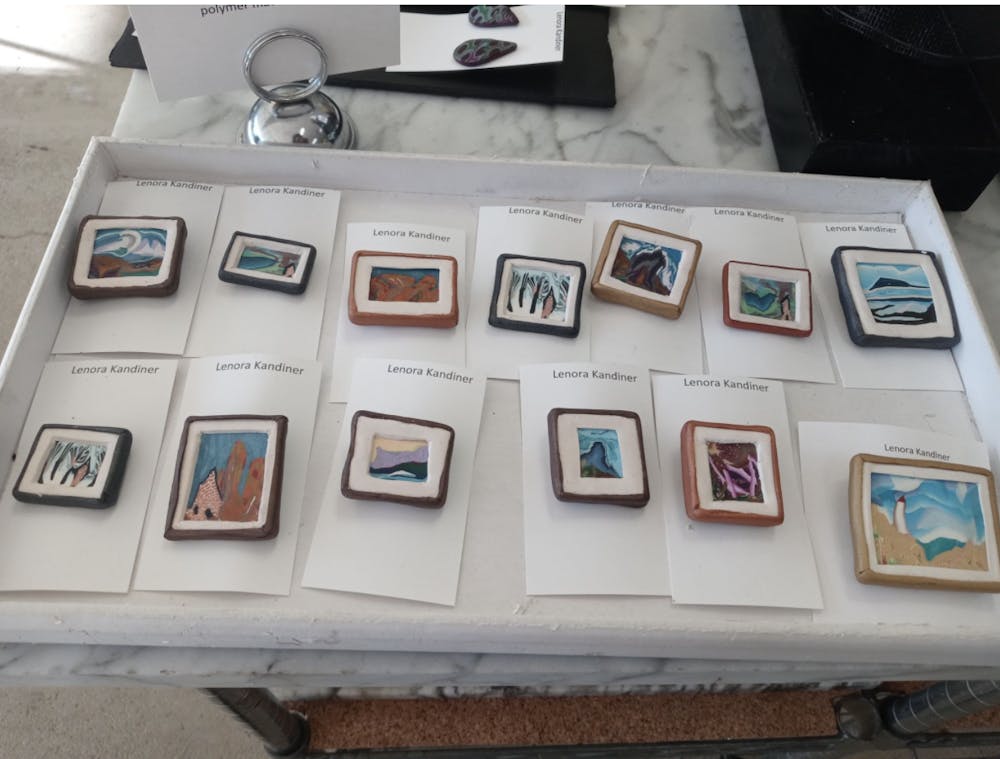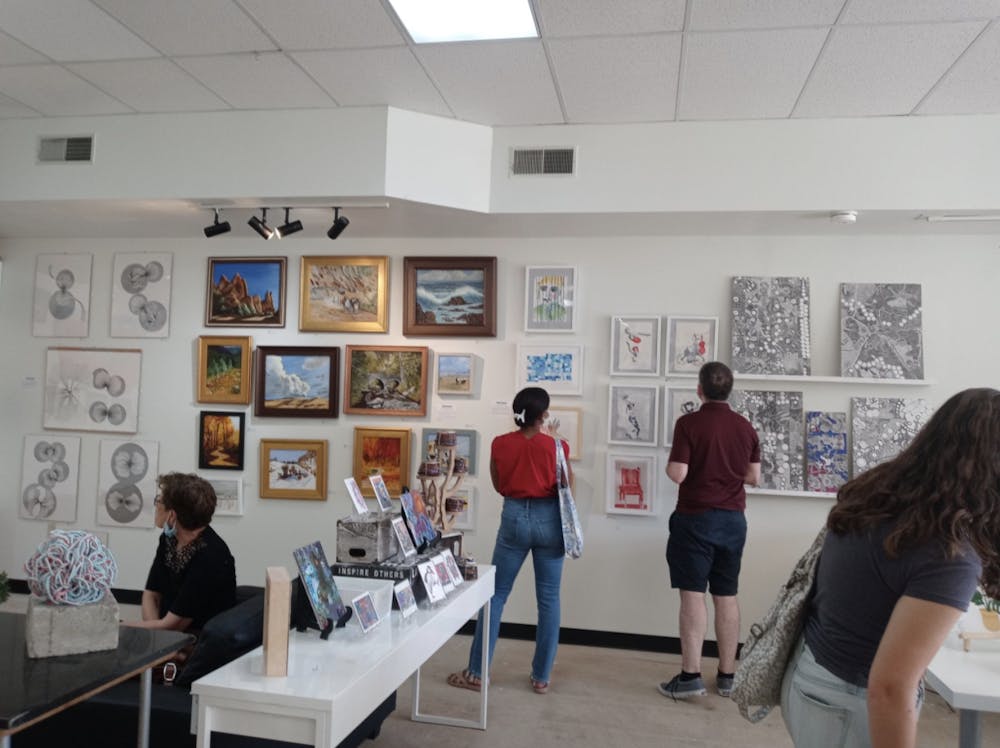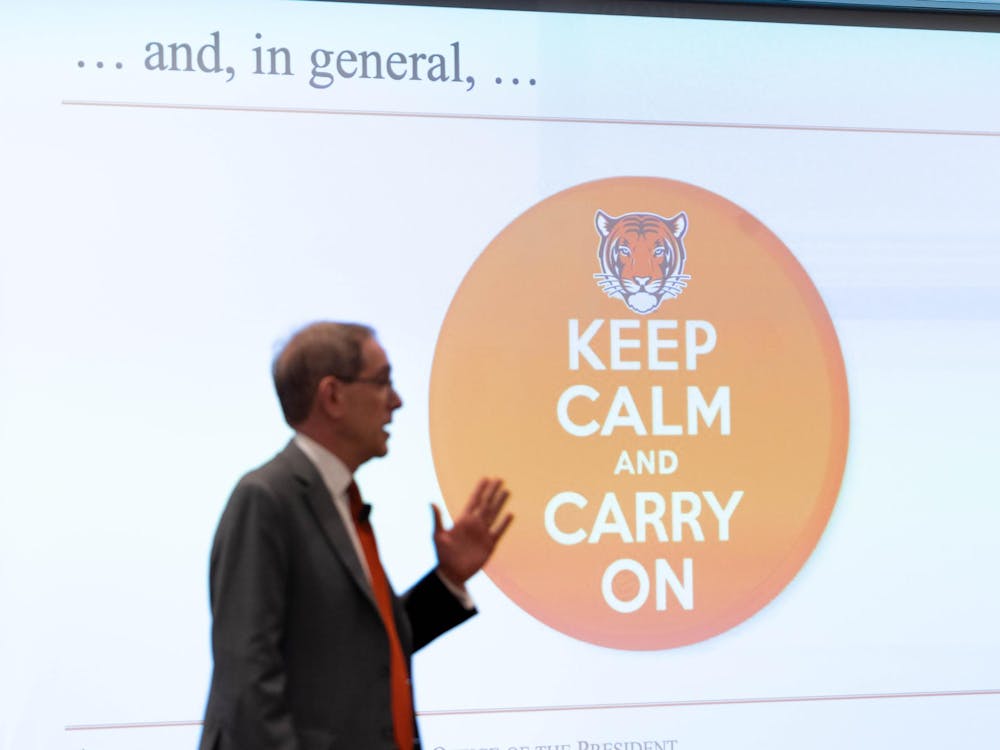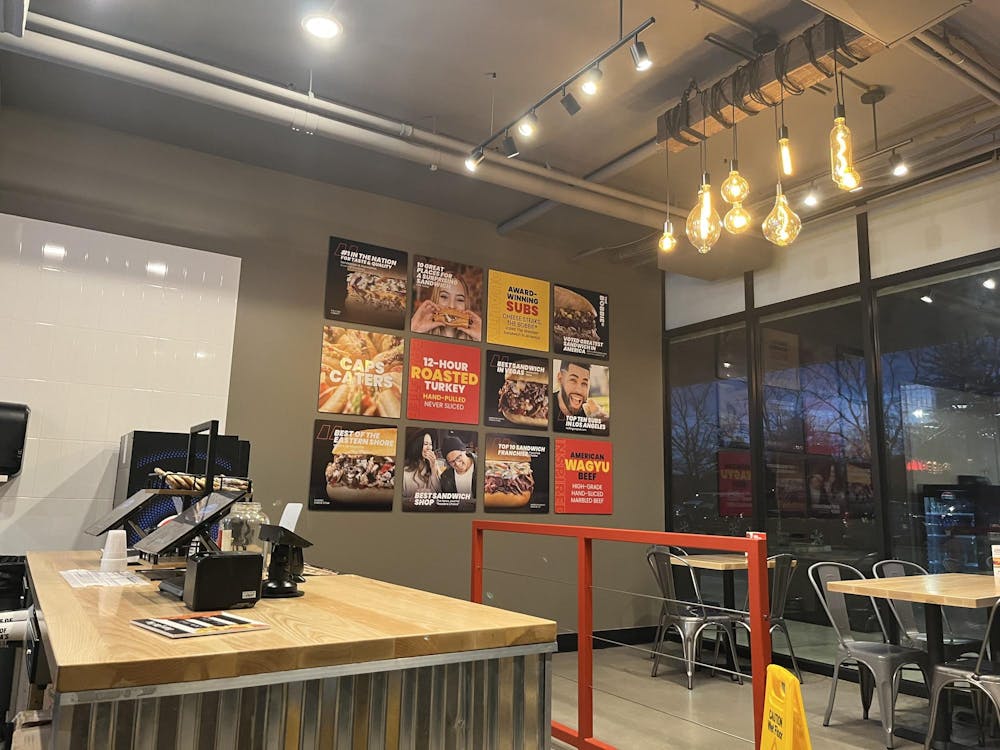Bernadette Suski-Harding loved to knit — at least, until she adopted her now-14-year-old daughter. Knitting and a then-two-year-old child were not exactly compatible, so the former took a backseat. She wanted to maintain some other creative outlet, however, so she thought she’d try playing with wire and pearls. Now, her wired creations are being sold at Princeton Makes, a new local arts cooperative.
“I like to play with textures,” Suski-Harding told The Daily Princetonian about her art. “Wire, pearls, silk ribbon, wool — different textures. I like to combine things and see what are some kinds of interesting, new things I can come up with.”

Wired, beaded jewelry made by Bernadette Suski-Harding, under the name “Penelope Plum Creations.” Penelope is the name of Suski-Harding’s daughter, who inspired her work.
Auhjanae McGee / The Daily Princetonian
Suski-Harding is just one of 28 artists whose work is being sold at Princeton Makes, located at Princeton Shopping Center. The co-op held its grand opening on Sept. 18, complete with live music and refreshments. Community members arrived and perused the space, stopping at the diverse displays of jewelry, textiles, photos, and paintings.
Princeton Makes is the brainchild of Jim Levine, former interim director of the Arts Council of Princeton. Levine wanted a studio space outside of his home for his stained glass art, so he came up with the idea for a co-op where artists have the opportunity to use studio spaces and sell their work on consignment in exchange for picking up weekly shifts working the shop. He then shared the idea with local artists, mostly by word of mouth. And while the pandemic has been detrimental for many local businesses, Levine believes it actually helped Princeton Makes gain traction.
“[Princeton Makes] gives people an opportunity to connect with other artists. People who had spent 12 months or 15 months working by themselves were looking for an opportunity to work with other artists,” Levine said.
Suski-Harding said she has enjoyed her experience with the co-op so far because of the ways it has already connected the community.
“This space has been transformed so beautifully,” she said, surveying the studios and art displays with a smile. “It's amazing to me how it looks now. I just think it’s such a cool idea, like you walk into this place, and there's all these different things made by local people … It's a great way to support local businesses.”
Spriha Gupta, a mixed-media artist whose work is inspired by nature and personal experiences, liked the idea of artists working together and expressed excitement about sharing the space with other creatives.
“So far, [the experience has] been really good!” Gupta told the ‘Prince.’ “I feel like everybody’s been very friendly, sociable, and everybody is all about sharing space ... You know, it’s all been good vibes.”
Gupta had met Levine prior to the co-op’s inception through volunteering at the Arts Council. Once she became aware of the co-op through an Instagram post, she reached out to him.
“You know, what I love about Jim is he’s very direct, and he’s very casually like, ‘Pick up the phone, call me.’ And he just told me, ‘This is what we’re doing. And if you’re interested, get in touch, and let me know.’”

After retiring, Levine was looking for some way to connect the local arts community and start a business. His background is in human resources, and he mentioned that working for a large company allowed him to get an idea of all its different functions. But he cited his time directing the Arts Council as being particularly helpful to learn the general management skills needed to oversee Princeton Makes.
In his human resources days, “I was a smaller cog in a much bigger company,” he said. “And here, it’s a bigger cog in a much, much, much smaller company. So it’s a lot of fun.”
The Arts Council’s mission is to bring the arts and arts education to the greater Princeton area via affordable and accessible workshops and classes. It was during his time overseeing the general functioning of the Arts Council that Levine realized the need for studio space in Princeton.
Lenora Kandiner, a member of the co-op who makes polymer art, also met Levine through the Arts Council, but got involved with Princeton Makes by word of mouth.
“I live in West Windsor, and a friend of mine who lives in Princeton said, ‘You know, you may not have heard about this, but there’s this artists’ co-op. It’s starting, and you might be interested,’” Kandiner told the ‘Prince.’
Kandiner said she got involved with Princeton Makes because she hopes to sell her work. She used to sell privately, but now Princeton Makes is the only place consumers can find her creations. She also shared that she enjoyed having artists around to collaborate with, like Suski-Harding and Gupta.
“I'm the kind of artist who thrives on interactions with others,” she said.
Not only do the artists involved with the co-op have diverse backgrounds and work with diverse art forms, but they also find that they are personally impacted in different ways by the creative process.
For Kandiner, she finds that her creations require that she be both technical and artistic. She began creating and selling polymer-based jewelry over 30 years ago, when she worked as a computer software sales representative. Now, even though she no longer works in sales, she finds that she still uses “both sides” of her brain. Her polymer cane slices, for example, require that she understand both vertical and horizontal dimensions of the clay in order for the slices to come out correctly.
“Visualizing a pattern that’s going to go through that way,” she explained, referencing the vertical construction of the cane, “and that you’re going to slice, that’s definitely a left-sided brain activity. Whereas most art … uses the right side of the brain.”

Polymer clay slices made by Lenora Kandiner
Auhjanae McGee / The Daily Princetonian
For Suski-Harding, her wired jewelry allows her to be creative and try new things — a much-appreciated break from her primary job as a freelance writer.
“That’s the business side of paying the bills,” Suski-Harding said, referring to her writing, “and this is more the heartfelt, art-y, side of it, where you get to create things and combine things in unusual ways.”
Gupta spoke extensively about the role of storytelling in her art and how it is her form of self-expression. She honed in on one of her series, called “Candor,” which she said is about being true to oneself. The series features works in vibrant shades of pink, purple, and gold, with lots of texture, which Gupta said can come from materials like cheese cloth and coffee filters.
“We wear layers, so many layers in society, right? Because there’s peer pressure, or you’re supposed to look a certain way, or you’re supposed to say certain things. And I’m so tired of that. I’m like, stop wearing so many layers, just be yourself!” she said.
As of right now, the front selling space of Princeton Makes is full, but there are plans to open up more space in October. People interested in getting involved with the co-op can email Levine, but should be aware that co-op members must commit to working in the store for at least four hours per week. As for the future of the co-op, Levine said he envisions the space having events, including poetry readings and artist talks.
“Once we get our feet on the ground for running the store,” Levine said, “then we’ll see if we can branch out into doing more events with the space that we have.”
Auhjanae McGee is a Head Editor for The Prospect who often covers media and Princeton culture. She can be reached at ajmcgee@princeton.edu, on Twitter at @auhj_marie, or on Instagram at @marionettes_jubalee.








